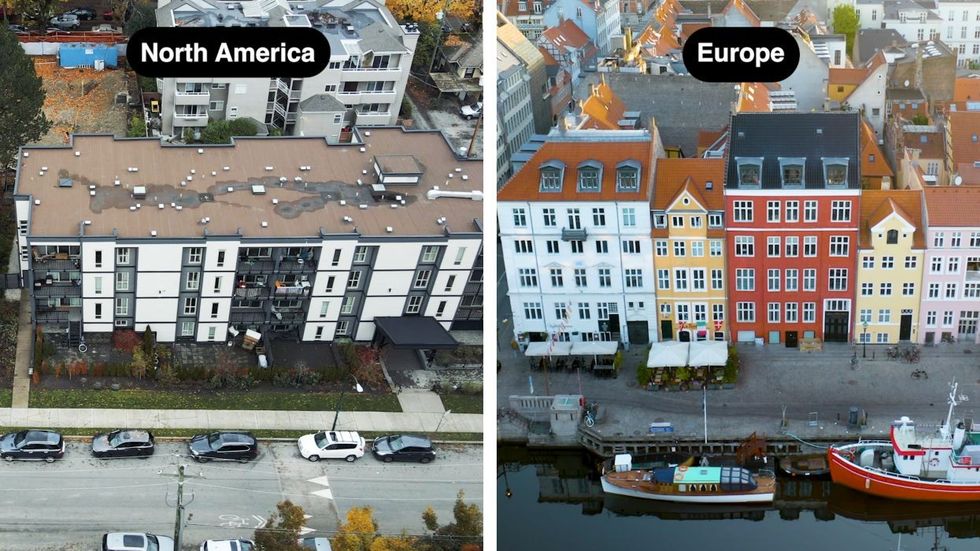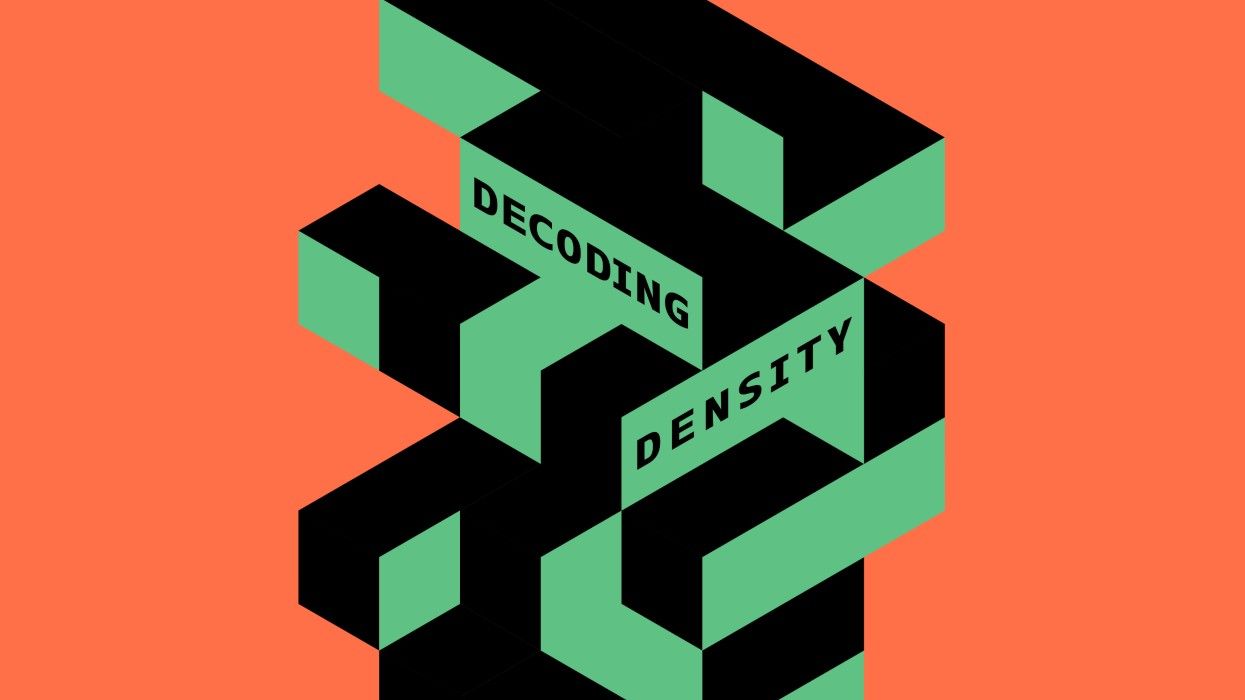The topic of missing middle housing — housing that falls between single-family homes and sky-scraping high-rises — has been a focus of cities around the world that are facing a housing crisis, whether they be in New Zealand, the United States, or Canada.
Here in British Columbia, both the City of Vancouver and City of Victoria approved their respective missing middle housing policies in 2023, and the Province subsequently followed up with their own policy regarding missing middle housing, which they are referring to as small-scale multi-unit housing.
On the heels of that, the Vancouver Urbanarium Society, an organization dedicated to the planning and design of communities that's akin to a think tank, recently launched its third ideas competition, Decording Density, which the organization describes as "an international invitation to imagine new possibilities for six-storey plus apartment forms by addressing two of the most existential problems of today: climate change and housing affordability."
As a result of various policies and regulations, six-storey apartments in BC are by and large just "boxes," says Urbanarium's Executive Director Amy Nugent. "They end up not being affordable. They're not really that beautiful. They don't address climate change. And they struggle to offer all of these livable and healthy features."
"As an alternative to condo towers, wood-frame (stick built or prefabricated) multi-family buildings in the six-storey range provide many benefits: simple, low-carbon construction, participation opportunities for smaller local developers and builders, less strong ties to global financial fluctuations, less excavation for underground parking, better contextual fit, and less shadowing/overlook," the official brief for the competition notes. "And yet, designers exploring apartment forms find that zoning, parking, and building code restrictions, combined with the financial and marketing factors to achieve affordability, generate buildings that struggle to offer access to outdoor space, family-oriented amenities, and other aspects of sociability."
The goal of Decoding Density, then, is to see if there are ways to come up with building forms that can provide all of the above.
"The six-storey apartment form is ripe for reconsideration," the brief concludes. "It holds the potential for low-cost construction using traditional methods of stick-framing or pre-fabrication and it avoids the intensive use of concrete, a significant contributor to global climate change. As municipalities work to intensify low-density areas, this scale of building will be increasingly used to answer the need for more housing at low end of the market cost. It is achievable by smaller-scale design practices and builders. This scale can be multiplied and adapted easily to different available sites without large land consolidation."
Final submissions should entail a building form with a floor space ratio between 2.0 and 3.0. The focus of the competition is on six-storey woodframe buildings, but entrants can also consider buildings between four and eight storeys, and can propose other construction methods, Urbanarium says. Entrants are encouraged to look at building forms around the world, consider alternatives to the current BC Building Code requirements that do not reduce public safety, and explore ideas that can reduce both cost and environmental impact.
"There's been 97 teams from 11 different countries registered so far," Nugent tells STOREYS. "That's really good! Our other competition, the Missing Middle competition, only had 80 teams registered. [This time], we're only half-way through the registration campaign and we're at almost 100 teams, and we've never hit 11 countries. It's so great. These design teams will be looking at the BC Building Code, looking at our housing crisis, and coming up with ideas."
The ideas generated through the competition will be featured in the popular About Here video series by Uytae Lee, whose most recent video, titled "Why North America Can't Build Nice Apartments (because of one rule)," launched the Decoding Density competition.

"We want these competitions to be useful, too," Nugent says. "And we thought that, "Hey, this has a real chance of giving people an opportunity to do something really creative, but also being able to affect policy change and inspire the region and the country at large."
There's the chance that ideas generated through the competition, which are then disseminated to local governments, can make their way into some of the work being done by governments across BC. Urbanarium's two previous competitions, the Missing Middle competition and Mixing Middle competition, were focused on the same theme, and some products of those competitions are now starting to turn up in work being done by various governments.
"When the new Minister of Housing, Ravi Kahlon, was appointed by David Eby, [Kahlon] called us immediately and went 'Can I get all your missing middle documents?'" Nugent says. "That's how we developed a really nice relationship with the Ministry."
Registration for the competition began on December 11 and will end on January 19. Competing teams then have to submit their entries by April 3, with an award presentation scheduled for April 16. The winning entry will take home $12,000, the second prize $8,000, third prize $4,000, and five honourable mentions will take home $2,000 each. This year's jury consists of Alfred Waugh, Cedric Yu, Frances Bula, Inge Roecker, Ly Tang, Marta Maj, Richard Henriquez, Sara Muir, and Shirley Shen.
Additionally, a Planners Prize will be given out on the advice of this year's Planners Advisory Panel, with the winner taking home $10,000. The Planners Advisory Panel consists of Dr. Gary Hack, Fellow of the American Institute of Certified Planners; Ed Kozak, General Manager of Planning and Development for the City of Burnaby; Kevin Spaans, Assistant Director of Development Planning for the City of Vancouver; Patrick Klassen, Community Planning Mangaer for the City of Surrey; and Suzanne Carter-Huffman, Program Manager, Urban Design, for the City of Richmond.
The Vancouver Urbanarium Society
The original form of Urbanarium was founded in 1985 by former City of Vancouver Director of Planning Ray Spaxman, who went to a planetarium in Toronto and thought that it would be great have something similar for cities and urban planning.
"It was always an idea to have a physical urbanarium, but it's never really happened, and we've kind of come to terms with that — that there might not be this big urbanarium like you see in cities like New York or Singapore or Amsterdam," says Nugent.
The organization, which is a not-for-profit and registered charity, is now driven by the 18-member board of directors and a 12-member board of advisors. Those members include a diverse mix of architects, landscape architects, planners, developers, and others in and around the city building community in British Columbia, such as Richard Henriquez of Henriquez Partners Architects, UBC School of Architecture and Landscape Architecture Associate Professor Sara Stevens, and former City of Vancouver Co-Director of Planning Larry Beasley.
"It's kind of grown into a place where we welcome everyone around the planning table," adds Nugent. "We're not a talking head organization. A lot of what we do is very participatory — getting hands dirty with competitions, or our city debates where experts speak about the future of our region, or our 'studios,' which are very interactive workshops where we pose a challenge or a problem and have some people in the know speak about it, and then people break out into groups and come out with a whole bunch of ideas."
Nugent says she's glad Urbanarium is able to hold a competition again, as funding an organization like Urbanarium is not easy.
"It doesn't really fit into the boxes of where public funding comes from," she says. "We're not really social services. We're not really arts and culture. We're not heritage. We're not health. We're not [recreation]. It's also really hard to get funding for this competition, too, because we're challenging the [existing building] code and asking people to come up with ideas that are illegal to do right now."
Urbanarium is currently planning more city debates for 2024, Nugent says, with possible topics being who should govern when it comes to housing, whether taller is better, and who should govern our parks.





















